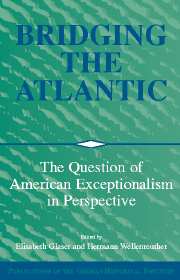Book contents
- Frontmatter
- Introduction
- Part One Transatlantic Faiths and Beliefs
- 1 Liberal Democracy as a Culture of Rights: England, the United States, and Continental Europe
- 2 American Exceptionalism: Republicanism as Ideology
- Part Two Transatlanatic Ideologies and the Perception of the Other
- Part Three People in the Transatlantic World The Perception fo Self
- Part Four Transatlantic Politics and Economics
- Part Five Transatlantic History and American Exceptionalism
- Index
2 - American Exceptionalism: Republicanism as Ideology
Published online by Cambridge University Press: 05 January 2013
- Frontmatter
- Introduction
- Part One Transatlantic Faiths and Beliefs
- 1 Liberal Democracy as a Culture of Rights: England, the United States, and Continental Europe
- 2 American Exceptionalism: Republicanism as Ideology
- Part Two Transatlanatic Ideologies and the Perception of the Other
- Part Three People in the Transatlantic World The Perception fo Self
- Part Four Transatlantic Politics and Economics
- Part Five Transatlantic History and American Exceptionalism
- Index
Summary
The relationship of republicanism to exceptionalism poses three problems: the nature of the ideology of republicanism; the extent, if any, of its effect on American development; and finally how, if at all, this relationship caused American society to differ from other societies. The three answers to these problems are that Americans shaped the ideology of republicanism to meet their needs, that in its altered form republicanism had a profound effect on American development, and that republicanism made American society different from other societies.
Throughout the nineteenth and into the twentieth century, Americans were self-consciously republican. They created a republican empire of liberty and equality by admitting new states into the union, and they invented the mass-based political party to facilitate its operation as a democracy. To enable the masses to cast intelligent ballots, Americans advocated universal education at public expense and preached the virtues of adult education. While American literature and fine arts remained indebted to European masters, American poets and painters cast about for inspiration at home, and Walt Whitman appropriately celebrated the virtues of the democratic republic in “free verse.” In addition, republican egalitarianism spawned new religions, inspired social reform movements, and, ironically, embroiled both sides in a long civil war.
- Type
- Chapter
- Information
- Bridging the AtlanticThe Question of American Exceptionalism in Perspective, pp. 43 - 66Publisher: Cambridge University PressPrint publication year: 2002



